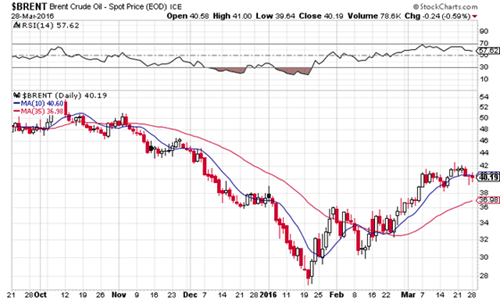It’s been a nice little rally since 11 February. The FTSE 100 is up 10.8%. Emerging markets are up 16%, if you’re going by the MSCI emerging markets ETF listed on the NYSE. But can the rally be trusted? Is it a move you can afford to bank your retirement on?
First, speaking of the market and rallies, what does oil tell us? It was hated in February and made 12-year lows. But then did it bounce. And how. And now?
Well you can see below that Brent crude is trading right at its 10-day moving average. But US commercial crude stock piles made a seventh consecutive weekly high last week. They’re at their highest level since 1930. How can you have an even bigger oil price rally when there’s already too much of the stuff?
Production cuts are one part of the answer. Oil producers meet in Doha, Qatar on 17 April to discuss cutting back crude supplies. But on price action alone, the rally since February looks tired. Give it a rest, oil.
Back to the retirement issue quickly. Short-term oil price action doesn’t have much to do with your long-term retirement strategy, except in one sense. Can you afford to be out of the market? Does staying in put you at risk for another big bear market just as you’re approaching retirement?
I ask the question because it’s on the mind of the 75 million American baby-boomers born between 1944 and 1964. These boomers have money in the market. But they’re also becoming eligible for Social Security benefits at 66. The wave of retirees began in 2012. It will rise for the next 16 years or so.
The question for the boomers is simple: when should they cash out and call it a day? When is the best time to sell? And who will buy?
Social Security is a big issue because it involves an immediate decision today that affects the rest of your life, and your quality of life. If you begin claiming benefits at the official retirement age of 66 – or even early at 62 – you get the money now.
You can do something with it. You can pay down debt. You can invest it back in the stockmarket. Or you can use it to supplement the income from your financial and real estate assets. That’s what Social Security was designed for anyway, income insurance in old age to supplement your self-funded retirement.
But there’s a financial incentive for delaying your benefits until the age of 70. By waiting longer to claim your benefits you can make as much as 8% a year more than by claiming early. The longer you live, the more difference that 8% extra makes over time. You can see the dilemma.
You don’t know when you’re going to die, to paraphrase the Book of Matthew (and Ecclesiastes). The decision becomes a calculated risk. Delay the consumption of your pension and work longer, get more the longer you live past 70. Or take the money now and enjoy its purchasing power while it lasts, and while you last.
The situation is different here in the UK. But there is a similar incentive to defer your pension until later. The longer you defer, the more per week you’ll receive when you do begin receiving it. Or you can take the instant gratification/maximum purchasing power argument and take a lump sum now.
What you decide will depend on a couple of factors: how much you have in savings, the amount of income you generate from other assets, your life expectancy and your appetite for risk. It’s the last one that interests me the most now. Why?
In America, the millennials – those born between 1982 and 2000 – finally outnumbered the baby-boomers last year to become the largest age cohort in America. There are over 75 million of them. And if the boomers are selling their stocks to pay for their retirement – or counting on Social Security remaining solvent for the next 16 years – it’s the millennials who are going to have to do the work of a) buying stocks and b) holding a job so they can pay the taxes that will fund Social Security.
It’s all shaping up to be changing of the generational guard. But will the millennials, who’ve lived their entire life during a great bull market, see the stockmarket as the logical place to build a retirement nest egg? Or will the concept of retirement, like the concept of lifetime employment at the same firm, seem outdated to them? And if so, who is going to buy the boomers’ stocks?
Category: Economics


